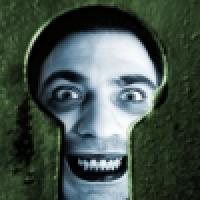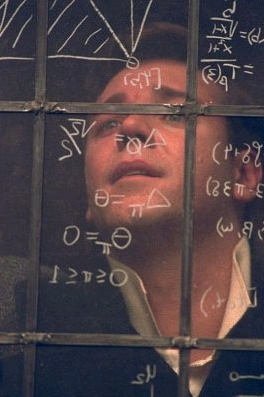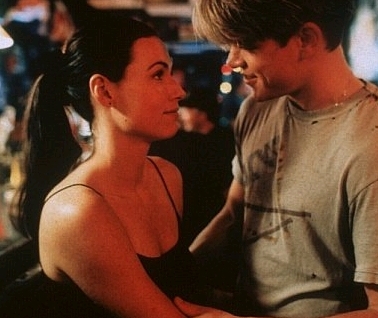
Maths, madness and movies
Mathematicians have often been considered a little eccentric; Charles Darwin once defined a mathematician as "a blind man in a dark room looking for a black cat which isn't there." Now, in the age of film, movie makers seem to go one step further: mathematicians appear to be disturbed at best, displaying a kind of neuroses through numbers. Browse the Web for films about mathematicians, and you will find a collection of protagonists plagued by mental instability.
In film, it seems that maths signals madness.
Intrigued as to why this should be, I decided to embark on an experiment; I resolved to watch as many films about maths as I could persuade my local DVD store to part with, in the hope of unravelling this conundrum...
23

Not your average mathematician. Jim Carrey in 23. Image © New Line Cinema, all rights reserved.
My first film, 23, claimed to be a thriller. To set the scene, the opening credits list various miscellanea about the number 23, from the number of chromosomes in a haploid cell to Hitler's birthday. These factoids supposedly provide evidence for a sinister association between 23 and the forces of darkness.
The plot seemed promising: a man (Jim Carrey) is given a book entitled — yes, you've guessed it — 23, a memoir of a man obsessed by a number. Carrey's character, believing the story is about his own life, soon finds evidence of 23's dark work everywhere. I was particularly enchanted by the observation that pink (due to the addition of its component red and white wave-lengths) is in fact a satanic colour. Other examples of numerical naughtiness were more disappointing: for example, Carrey's character is riddled with dread at discovering his wife has 23 shoes. Perhaps many husbands would find that quantity of footwear similarly terrifying, but I couldn't help feeling we were hardly pushing the horror-envelope. Carrey's long-suffering wife (Virginia Madsen) becomes increasingly concerned with her man's obsessive behaviour as he points out instances of numerical demonism, leaving the audience to wonder whether we are viewing some dark power, or mental breakdown. The trouble with the film was that neither were convincing.
Yet, despite its disappointing execution, 23 poses an interesting question — do some numbers have a meaningful association with some kind of supernatural presence? Wikipedia assures me that there is a genuine belief in the world (called the 23 Enigma) that all numbers can be traced to 23, and many cultures endow different numbers with specific associations: 666 (the number of the beast), 7 (considered lucky), 13 (considered unlucky), 4 (the number of death in China) and 99 (the number of eternity). That numbers hold a power beyond human understanding can be seen as a blessing, not necessarily a curse. St. Augustine of Hippo (AD 354-430) once commented that "numbers are the universal language offered by the deity to humans as confirmation of the truth." Then again, a little later, he offered a somewhat more pessimistic view: "The good Christian should beware the mathematician and all those who make empty prophecies. The danger already exists that the mathematicians have made a covenant with the devil to darken the spirit and to confine man in the bonds of hell."
That a number or numerical system can become associated with any kind of consciousness at all is a fascinating concept and one that my next film exploited to the full.
Pi

Sean Gullette in Pi. Image © Artisan Entertainment, all rights reserved.
For a truly terrifying watch, Pi has earned its reputation as an avant-garde maths classic. Max (Sean Gullette) is a number theorist who believes that everything in the world can be understood through numbers if they are only graphed and charted correctly. Max's trusty sidekick for his philosophical adventure is a homemade computer named Euclid. Euclid decodes a pattern in the stock exchange (supposedly an unpredictable system) spewing forth a 216-digit number before crashing, a point in the film that caused me almost painful empathy.
Predicting the outcome of financial systems stimulates the interest of stock market moguls, and the elusive 216-digit number also attracts the Hasidic Jewish community, who claim a divine origin for it. This juxtaposition between worldly ambition and spiritual questing is handled well, with both becoming equally terrifying: the idea of a universal pattern is ordinarily a reassuring one, but in Pi, the ordered world is far from comforting.
Max has a former mentor, Sol (Mark Margolis), who also claims to have come across this 216-digit number during his own research into Pi — this, Sol claims, directly led to a premature stroke and early retirement. Undeterred, Max continues with his research, but appears to be spiralling into insanity. Pursued by Hasidic mathematicians and Wall Street brokers alike, we follow Max's effort to unravel the mysteries of a numerical system that appears to underwrite the world. His deteriorating state of mind, genuinely unsettling to watch, is a clear and important theme to the film, supported by jerky black and white photography. Pi achieves what 23 could not, that is, a plausible balance between madness and genuine esoteric activity as the source of its protagonists' experiences.
If in a nerdish sort of mood, you can spot the odd mathematical error, suggesting that the focus (and budget) of the film was more arthouse than mathshouse — for example, Pi is incorrect at the ninth decimal place, and a golden rectangle is drawn wrongly; yet I found myself able to forgive pretty much anything for the film's undeniable quality. Pi is not for the faint-hearted, (or those for whom mathematical inaccuracies will irritate) but it's well worth watching.
Two films in, and so far numbers, in one way or another, have had a sinister hold over the mind of the heroes. In the aftermath of all this gloom, I found myself hungering for some kind of light relief. The movie world seems convinced that maths can be terrifying — but can it be romantic?
Proof

Maths and romance? Gwyneth Paltrow and Jake Gyllenhaal in Proof. Image © Miramax, all rights reserved.
The next film I reached for was Proof. The cover looked promising, showing an image of a Merchant-Ivory-esque woman looking very intense, with a well-muscled man in the background. Perfect. Yet, despite my hopes, Proof is, yet again, a tale of maths haunted by madness. The film tells the story of Catherine, (Gwyneth Paltrow) the daughter of a recently deceased mathematician (Anthony Hopkins). Catherine has sacrificed much of her own life to nurse her father through psychological illness. Overshadowed by his genius and reputation, her own mathematical abilities, which formed the basis of her relationship with her father, are overlooked. She herself is haunted by the possibility of her own mental health deteriorating, a fear compounded by the pain of bereavement. Enter the handsome and sane (if a little less gifted) mathematician/love interest Hal (Jake Gyllenhaal), who is hungry to discover whether there are any unpublished theorems hiding in the dead professor's office. When he discovers a notebook with a mathematical proof of sublime perfection, his challenge is to discover whether Catherine or her father wrote it, and, harder still, how to prove authorship.
The performances are strong, bringing out an association between mental fragility (be it grief or mental illness) and brilliance, revealed through a fascination with maths. The central theme of the film is engaging: problems in theorem and calculation find their parallel in reality, proving that maths imitates life no less than art does. However, this is an idea that could have been pushed further. There are a few one-line mathematical jokes, but no attempt to unravel what the illusive theorem is — to spell out the genius of it all might have necessitated either plagiarism or genuine mathematical brilliance on the part of the script-writers, but it seems a shame that, in an otherwise excellent film, the maths remains un-translated from its notebook.
A beautiful mind

Maths induces graphomania. Russell Crowe in A beautiful mind. Image © Imagine Entertainment, all rights reserved.
In contrast, A beautiful mind explores the maths as well as the life of mathematician John Nash (Russell Crowe). An iconic scene finds Nash and some mathematically minded friends in a bar, describing how game theory can help them pull. To my mind, this is exactly the film-friendly PR that maths needs more of. I was slightly less convinced about the mathematical art of pointing out shapes in stars to one's love interest — surely that's a universal compulsion after a few pints? I am certain that most of us, if thus sozzled, could pick out an elephant or two.
Using biographical material also enables Nash's character to achieve a greater depth than is possible for fictional film characters; from his early years at Princeton, through years of mental health problems to his winning of the Nobel Memorial Prize in Economics, Nash's academic triumphs and personal struggles make for compulsive viewing. He faces schizophrenia with courage and is anchored to the world by his love for the people in it. This depth and humanity makes it possible to identify with Nash, and perhaps makes for a more realistic portrayal of a mathematician.
Yet, the fact that A beautiful mind, is also the archetypal film about maths and mathematicians causes me to think that my initial theory is possibly right: mathematicians in film seem invariably disturbed, finding patterns in everything with no boundaries between reality and the alarmingly abstract world of numbers. From the moment the first credits roll, you can almost predict the point at which one of the sane protagonists discovers that their numerically inclined love interest/colleague/mentor has been scrawling over the walls. In better films, such as A beautiful mind, this graphomania is genuinely chilling, an uncontrolled exposition of a mind turned inwards, and of genius unravelling. Less successfully, the random scribbling is reminiscent of low-budget horror films where it's used as a short hand visual to signify demonic possession.
I wondered, therefore, whether any films about maths exist with a sane protagonist? Would it make for a good film, or does the continual insistence on a troubled genius betray a reluctance to engage with the nitty-gritty of more ordinary mathematics?
Good Will Hunting

Matt Damon and Minnie Driver in Good Will Hunting. Image © Miramax, all rights reserved.
To answer this question, I looked to Good Will Hunting to give me a happier ending. Here, a young man (Matt Damon) with a brilliant mind has a penchant for self-sabotage. He escapes his life of booze, friendship and fighting to creep about a maths department, there to decode cryptic equations left by the resident academic, Professor Lambeau (Stellan Skarsgård). This reversal of standard student behaviour illustrates the fact that all is not well with Will. When Will's violence causes a ruckus with the police, Lambeau offers him a choice: to learn maths and take therapy, or to go to prison. Even for Will, this is something of a no-brainer. Although Good Will Hunting deals with emotional trauma, maths, for once, is not to blame. As the relationship between Will and his therapist turned mentor Sean (Robin Williams) develops, he discovers that people rather than numbers are the root of all evil. We even see several sane mathematics professors having ordinary conversations about their subject. Occasionally, they even give lectures that look vaguely realistic. So far, so good.
Yet the film has a weakness, in that Will explores all manner of issues with Sean except the one he's likely to be burdened with for the rest of his life: namely, the impact of living with his own genius. And it is this discrepancy that sheds some insight into my enquiry.
With the exception of 23, the lead mathematicians in film all seem remarkably gifted, and that comes with a heavy price. Maths does not so much equate with madness, but it does, sometimes, associate with an intelligence that can be impossibly hard to cope with. Max, Catherine, John and Will, unlike their less gifted colleagues and friends, are all tinged with genius. This mathematical fluency brings revelations, and here, to some extent, numbers themselves appear to be to blame: they are portrayed in film as a maze of complex symbols too abstract for the everyday mind to bend round. Only genius can hope to unravel the secrets of scribbled equations. For a society fluent in symbolism (from the toilet sign to the Freudian slip, we all seem to manage), this phobia of numerical signs deserves further attention.
Why should ability in maths be such a burden, and what secrets do our hapless protagonists discover? While the majority of human symbols encode human inventiveness (a road sign, a trademark, a political moniker), numbers pose a far more expansive puzzle, and one that only a mind touched with brilliance can truly light upon: numbers are capable of coding nothing short of life, the universe and everything.
And to the film makers, perhaps the world just isn't meant to be understood.
More information
To read more about the maths of A beautiful mind, read the winning entry in the general public section of this year's Plus New Writers Award, If we all go for the blonde.
And to bring the maths of the movies to your ears, listen to the Plus podcast from the maths film festival at the Edinburgh science festival.
About the author

Charlotte Mulcare read biological anthropology at Cambridge, and has recently completed a PhD at University College London in human genetics. The project used DNA samples from modern populations to trace the migration and selection patterns in Neolithic farmers. She currently works as a science writer (fact and fiction!) and lives in Oxford.
Comments
Anonymous
Dustin Hoffman and Susan George play an American mathematician and his English wife in Straw Dogs (1971), a thriller directed by Sam Peckinpah. In this movie there is quite a lot of madness (rampant violence) but no math to speak of, other than the main character is supposed to be a mathematician. He is timid at first, and people think he will be a push-over. Maybe the author's idea was that everybody would be surprised when this seemingly timid, unimpressive character is the one surviving man after rescuing, and avenging his wife from the thugs who attacked them.
Anonymous
Just came across this, many years after the author wrote it; so a late corrective.
With regard to the comment about Augustine in your notes on 23: "the good Christian should beware the mathematician and all those who make empty prophecies." Please note that when Augustine referred negatively to mathematicians, he was not referring to those doing scientific work. The term was a synonym for astrologers!
Shahrooz Janbaz
Thanks for your interesting writing and your experience about math movies.
I am a mathematician, and I also watched these movie. Firstly, I suggest to see the film "Professor and his beloved equation".
Mathematics, is a kind of science which needs a mental tool: abstract thinking...
When you want to see things abstractly, you must spend some time with yourself and just interpret many relations and variables in your brain by your own personal language. These materials do not exist in the real world as things. So, some time, mathematician schismatize from the real word. This procedure can be addictive, since I believe that our inner world is so deep and strange. Numbers (with any forms which can have) are the backbone of abstraction. As a joke, I think all things in the world (or maybe worlds) are connected to each other. My reason is, for each thing as like as "x" take the number "T(x)". Now, for two arbitrary things "x" and "y", we have "T(x)+P(xy)=T(y)", where the term "P(xy)" is the connecting number of "x" and "y".
I hope we see many new interesting math films.
Best wishes
Shahrooz.Janbaz